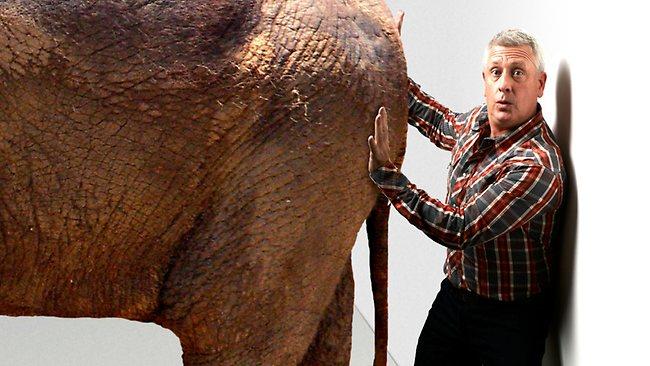Elephant in the room of Andrew Denton and Dicko's panel show Can of Worms
DENTON and Dicko team up for a chat show that cuts right to the heart of things.

THIS is the strangest preview of a TV show I've ever seen, even though there are lots of laughs as the cream biscuits are passed around by Andrew Denton.
I'm sitting among a group of TV writers and journalists in a small office room at Sydney's Global Studios in the city's inner west, where Denton's company Zapruder's Other Films has hunkered down to produce its new series Can of Worms.
This is Ian "Dicko" Dickson's panel show, produced by Zapruder in conjunction with WaterCooler, owned jointly by Dickson and David Wilson. As Can of Worms was nearing its launch, TV writers were invited to various presentations in order to "sample" the show, with different journalists asked to occupy the guest chairs. At the time we were all placed under an embargo about how the format functions but were able to sneakily peek at it in operation.
Or, at least in a well-organised rehearsal, look at an unadorned presentation of the idea of the show and determine whether what script writers call "the essential integrity" cuts through. The series will be recorded shortly before it is broadcast in order to keep it topical, so no preview discs are available for reviewers to assess the show in time for their deadlines.
Described as a more youthful Q&A, Can of Worms tackles divisive talking points and issues in the news with its guest panellists of celebrities and people known for strong views and, it would seem, an abhorrence of political correctness. It will also include social media in the manner of Tony Jones's ABC panel show, as well as polls and games, so we see it without the assorted electronic bells and whistles.
We are sitting on plastic chairs facing the front of the small room, a large white board and a small black podium where 47-year-old Dickson, looking lean and clear-eyed, is examining some notes. Three journalists of varying ages sit on chairs facing the podium, chatting nervously among themselves.
Comedian Meshel Laurie, who has the gig as Dickson's argumentative "second banana" sidekick, sits quietly. A Brisbane breakfast broadcaster, she's a fine comic, never short of a word or an opinion, with an agile brain, timing and comic discretion.
Dickson suddenly perches himself on a chair in front of us and talks quickly and urgently about the series, telling us that he is desperate to be seen differently, to be viewed in a new light. He's really saying he wants to be taken seriously. There is the slightest edge of psychodrama in the air. "This is a show I'm ever so keen to get right," he says intently. "I want to be part of something that I know encourages people to think."
The former record industry executive speaks disparagingly of his career so far, having become an instant celebrity as the cranky judge on Australian Idol and with less successful outings hosting My Restaurant Rules and Celebrity Survivor, before eventually returning to the Idol franchise. "I'm the record industry whore who became the reality TV whore," he says grimacing. "I'm asking Australia for a chance to do this."
He's a practised talker, engaging, candid, occasionally cheerfully profane and obviously determined. Thankfully there's none of the polished vacuity of so many TV presenters. "I thought I could handle it all and I think it's OK being famous when you're young and lovely or super talented but if you don't feel super talented or you don't feel young and lovely, it's really confronting having your stupid, talentless fat jowl staring back at you from magazine racks," he told Denton on Enough Rope three years ago.
Denton re-emerges snappily from the back of the crowded room and launches into a speech of welcome that really is more of a stand-up routine, but an air of gravity hovers around the jests.
You sense his iconoclasm keeps him in touch with the diverse fractions that make up the common denominator of the TV market. It's obvious as he speaks that he relishes his developing relationship with Ten and the chance of reaching an audience that's not just composed of rusted-on ABC viewers.
"This is what theatrical folk call 'a stumble-through'," he says of the occasion, but it turns out to be more polished than most rough dress rehearsals I've endured either in the theatre or in TV. "We're workshopping ideas here, really," Denton continues. "This is obviously not a pilot."
He says the process is similar to what he put The Gruen Transfer through as producer. There, in 12 different workshops involving participating audiences, he road-tested the various means by which he could entertainingly take a closer look at TV advertising. That program is a show that tweaks our perceptions so we are exposed to areas we would normally pass by in our viewing. He suggests that's what Can of Worms is aiming at when it comes to clear thinking and rational debate.
"We want to explore that area between the shock jocks and the opinion leaders. We want to find that middle ground and explore it: what do people really think, why do they think what they think and is it actually negotiable?" He hopes it will be "a show about public morality, a kind of moral barometer, and a safe space for real opinion".
There will be humour, obviously. "Though we don't want to fish in the same pond as Good News Week," Denton says. Then having raised the notion of comedy, he jokingly suggests the show will also contain a circus, acrobatics and a cooking section. "The challenge for us obviously is to make the grey areas of opinion and comment actually compelling to watch."
Typical talking points during the show's development -- there are two each episode -- have included Jackie O's decision to breastfeed her baby while on the move as she crossed a Sydney street. As well as, is porn a normal part of everyday life? And, is it wrong to tell your kids there's no God? These kinds of questions are what Dickson calls "the worms" that are released from the proverbial can in the hope of triggering debate among the celebrity guests and in the TV audience.
Today Dickson lets this worm out of its can -- or, to put it another way, identifies the elephant in the room -- as the workshop gets under way: is it OK to spy on your kids online?
The discussion is lively and highly entertaining as Dickson and the panelists canvass cyberspace notions such as back-dooring, brick-joining, smut-mining, grooming and poking and the dangers -- or not -- they represent to kids.
There are witty games within games and clever instant question-and-answer segments. Each punter has a "Yes" and a "No" card, though all constantly change their stances as the arguments gather velocity. It's actually very funny.
Dickson is rougher and gruffer than Denton as a TV talker, his thick accent occasionally impenetrable. "That could be the big stumbling block," says a female journalist to her friend behind me, as some of us look around, no idea what the compere has just said at one point. But he's assertive, dogged and, using often personal images drawn from his own experiences, somehow always manages to make his intention clear.
His slight sense of apprehension works, in a way, as a bridge for those watching, most of us equally hesitant when it comes to confronting questions that tackle our sense of personal morality and really core values. He's adept at puncturing any trick of logic or language that allows a statement or claim to be passed off as something it wasn't really.
It's something Stephen Fry does so well in QI as well, showing the way that what might appear to be a supporting argument for a particular contention does not support it at all. Dickson's format reveals how genuinely ignorant many of us are of logical reasoning, the nature of supporting evidence, or what counts as relevant material.
"Yes, but what if," Dickson asks constantly, drawing on the research his team of writers and journalists has structured in their own workshops. "Have you ever thought of what would happen if . . .?" The title phrase of course means that once you open a can of worms, the only way to contain them is to use a bigger can.
In other words, once you interfere with it you can't just put it back again the way it was; you will have to deal with it, and it won't be easy -- as the sometimes heated argument surrounding today's worm demonstrates.
These kinds of intelligently prepared panel shows may be cheaper to produce than TV sitcoms or dramas but are often the source of more humour than the comedies and more insightful than dramas. They ask us to look at the world differently, to question our habits, expectations and prejudices. They subvert the conventions of TV news and current affairs and, exploiting their great potential for light entertainment, ask us to be sceptical about the things we take for granted, and to look at the world askance.
Good luck, Mr Dickson; hopefully we'll never have to use the moniker "Dicko" ever again.
A REAL life can of worms is opened in the ABC's feature documentary Leaky Boats, which screens on Thursday, before a special Q&A debate, Stopping the Boats, moderated by Tony Jones. It celebrates the 10th anniversary of what became known as "the Tampa affair".
You may remember how on the last Sunday of winter in 2001, 10 weeks before a controversial federal election, a fishing boat was sinking far off the Australian northwest coast. Alerted by Australian Rescue, a Norwegian tanker, MV Tampa, piloted by Arne Rinnan, went to its aid. His crew pulled 433 refugees out of the leaking boat. But as the captain set his course for Christmas Island in Australian territory, he was told by radio orders had come from the top that his ship would not be allowed to land.
It was the moment Australia stopped the boats, triggering one of the most dramatic weeks in our history. "We will decide who comes to this country and the circumstances in which they come," said then prime minister John Howard. It's the line that unifies the scattered moments of this time in history. "This wasn't a scripted line; it just came to me," Howard says in the film. "And that's what the Australian people believed, and because it captured the mood of the nation, it resonated."
Warships were sent to confront the boats; parents were said to have thrown their children overboard; another boat called SIEV X sank, taking 353 people to their deaths. The public conversation was manipulated to demonise the boatpeople. The government wanted "to portray that they were not normal people," says Gary Bornholt, head of military public affairs, a formidable witness.
Then, as narrator Noni Hazlehurst says: "Normal was over." The Twin Towers came down and we looked at the US across the Pacific with profound sympathy as across the Indian Ocean boats filled with Muslims still came towards us.
The decision to stop the Tampa turned out to be one of the most popular ever taken by an Australian government.
Written and directed by Victoria Midwinter Pitt, this is a suave essay, at times poetic and even tender, on the physics of power, calmly and impassively dealing with ambiguities and political conundrums. She tells this story through the testimonies of those who were there. They include Howard, Peter Reith and Kim Beazley, navy admirals and military chiefs, SAS commandoes, Afghan farm boys and Iraqi school girls, as well as the pollsters and political advisers who watched how Australians responded.
Given the divisive nature of the film, its frank expose of political chicanery and moral panic, it is unexpectedly elegiac and moving. And the interviews are juxtaposed with director of photography Jim Frater's quite beautiful slow-motion sequences of older Australians engaged in aqua aerobics, young people learning to swim in municipal pools, and people sunbathing at beaches around the country. Water unites us, yet nothing divides us more.
Can of Worms, Monday, 8.30pm, Ten.
Leaky Boat, Thursday, 8.30pm, ABC1.


